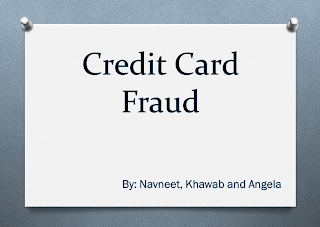here is a screenshot of our powerpoint:
Definition:
Credit card fraud is the use of a credit card with the intent to commit fraud. This includes use of a credit card to illegally obtain funds, services or goods by means of deception. It can be committed with a person's personal card, with a business card, a stolen card or a counterfeit card.Credit card fraud also extends to the theft of personal information in order to gain access to another individual’s account or to create an illegal, fraudulent account, which is also a form of identity theft.
How are databases involved in this topic
Databases are involved in Credit Card Fraud as they require a person to attain the
following information:
OExamples of the information that they would need to steal your money
OYour full name
OYour address
OYour social security number
OYour complete bank account number (if you have direct deposit)
OYour employer and its address
Describe the type of data stored about individuals?
OThe first track contains your name, the card's account number, and its expiration date. It also has code for the country in which the bank operates.
OThe next track repeats the account number, expiration date and country code. This track is smaller than track 1.
OData on the third track was meant to be updated with every use. Though this track was set aside and defined by the original specifications, no bank currently uses it.
OOther Data
OSpecial coded information marks the start and end of each track. The
tracks also have open areas where institutions can keep other information
unique to their businesses.
OThe lines on the credit card give your name, address, and credit card
number, as well as a few other necessary details.
OYour rate of pay
Describe some of the ways in which this
data can be misused?
OBy attaining information as simple as the following frauds can do multiple
things. For instance a fraud can open new bank accounts, lease or buy
cars, get insurance, pretty much anything that involves money and your
card.
OFurthermore there is very little additional information that is required in
order to obtain a loan. For instance you can simply obtain a home equity
loan through fax and signing documents over the phone, which can then be
faxed with ease to your financial loan officer. Now it is not very difficult for
someone who attends to steal your credit card identity to do all this by
simply attaining the information above.
OIn addition your information can also be used for criminal activities such
as :
OComputer and cyber crimes
OOrganized crime
ODrug trafficking
OAlien smuggling
Describe are the ethical responsibilities of
maintaining this database?
A chargeback occurs when a purchase made through the merchant
account is returned or a refund is made, for whatever reason. Some of
the most common reasons include a returned product, a mistake in
billing or faulty services offered. When a chargeback occurs, in most
cases, you will still have to pay a processing fee. These fees might seem
small; however, they can add up and can be very destructive to your
business. Charge backs can be especially devastating if your company
offers a quality guarantee on the service or product. Before making any
guarantees, consider the possible costs that can accrue with a
chargeback.
What are the legal repsonsibilities of maintaining this database?
Some tips to prepare yourself include:
OManage your current payments – Start a habit of paying bills before they’re due. This shows you’re able to pay back loans on time. That will help give you a better credit rating in the long-term (which is what credit providers are interested in) once repayment history is made available under any new laws.
OMake a plan – Ask your credit provider about repayment options if you’re struggling to meet repayments, or seek professional help if you think you might struggle in future.
OCheck your file – Ask a credit reporting agency for a free copy of your credit report to understand what’s already on your credit file.
OKeep in touch – Keep an eye out for news on any credit reporting changes as they happen. For example:
Oon your credit card statements and other loan statements
Oin advice from financial advisers
Oin the media
Oon consumer credit websites
Osign up to the Office’s OAICNet news alerts.

No comments:
Post a Comment